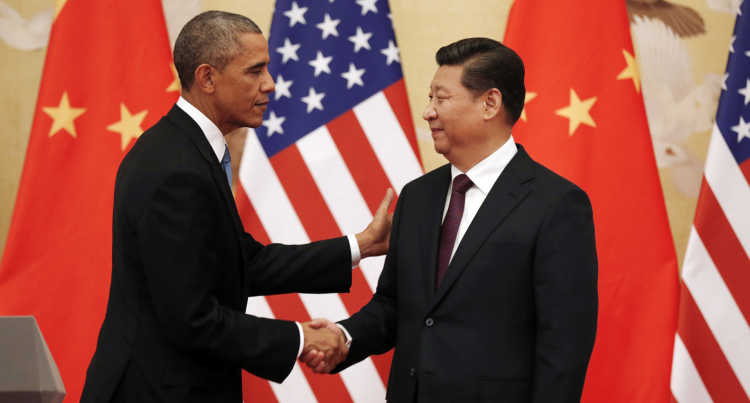- Home
- Publications
- GIGA Focus
- China in the G20: A Narrow Corridor for Sino–European Cooperation
GIGA Focus Asia
China in the G20: A Narrow Corridor for Sino–European Cooperation
Number 2 | 2017 | ISSN: 1862-359X

Since it hosted the G20 summit and since Trump’s ascent to the US presidency, China has promoted its role as a defender of free trade. In line with European interests, China has also become a supporter of G20 attempts to tackle the emerging crisis of globalisation. Indeed, China has many reasons to be a facilitative player in the G20. However, its engagement entails limitations for the G20 going forward.
Compared to India, another emerging power, China has assumed an active role in the G20, seeking to put its stamp on the G20 agenda and calling for the forum’s transformation from a crisis-response mechanism to one of long-term economic governance.
There are various incentives for China to play this role: the G20’s small but widened membership relative to the G7, the opportunities for status enhancement and for pushing global governance reforms, the loose institutional design, and the focus on issues that China feels comfortable dealing with.
However, China’s prospective engagement has limits. We cannot expect China to agree to a widening of the agenda beyond financial and economic issues. Also, it seems unlikely that China would offer the kind of visionary leadership necessary to fill the hegemonic vacuum should the United States continue to disengage from global governance.
In the longer term, attempts by the G20 to tackle its perceived lack of legitimacy are unlikely to be welcomed by China. Calls for institutional consolidation, transparency, and accountability in the move towards more representative global institutions go against China’s key motives in supporting the G20.
Policy Implications
The corridor for Sino–European cooperation in tackling the crisis of globalisation through the G20 is clearly circumscribed: only if the G20 agenda stays focused on core financial and economic issues will China remain a facilitative player in this grouping. The sole way to prevent increasing tension between the G20’s efficiency and its legitimacy is to push for continued reforms of the traditional global institutions, allowing emerging powers a bigger say in the existing international order. If the architecture of global governance cannot be reshaped from within these global institutions, incentives for China to leverage its growing stature within alternative institutions will increase.
China, Globalisation, and the G20
At the same time as globalisation has been sliding into crisis, the last year has seen China become one of the world’s most unswerving supporters of an open and multilateral global economic order. Two recent top-level events were particularly indicative of this trend. First, the G20 Hangzhou summit in September 2016 provided a preview of China’s increasing role in fighting anti-globalist tendencies. As the hosts, the Chinese leadership set a summit agenda that was, among other things, highly in favour of globalisation. Second, and even more pronounced, was Chinese president Xi Jinping’s speech at the World Economic Forum in Davos in mid-January 2017. As the first-ever Chinese head of state to attend the annual Davos meeting, Xi essentially cast himself as a staunch defender of free trade and economic openness. More precisely, Xi sought to advocate trade and investment liberalisation while strongly rejecting protectionist propensities elsewhere.
To be sure, Xi’s Davos speech must also be viewed in light of the rhetoric coming from newly inaugurated US president Donald Trump around the same time. As Trump repeatedly promoted his “America first” approach and voiced a clear preference for bilateral “transactionalism,” growing fears about an impending trade war with Washington were certainly raising alarm bells in Beijing. After all, China’s continued economic development and domestic social stability remain dependent on the free access to world markets and the sustained inflow of foreign investment and technology.
Against this background, it has made perfect sense for the Chinese leadership to champion open markets and a functioning world trade and investment system, as well as to choose the G20 as a key venue to address these concerns. Already in 2014, the G20 was perceived “as the lynchpin of China’s involvement in global economic governance” (He 2014a: 5) – a role that has only become more pronounced in light of the recent crisis of globalisation.
Both China’s championing of globalisation and its choice of the G20 as a crucial mechanism with which to do so seem to be in line with European interests. However, in order to realise the potential for Sino–European cooperation in the G20, policymakers need to understand that China’s increasing engagement in the grouping is dependent on the G20’s trajectory going forward. In other words, China’s continued active engagement will entail constraints on the G20’s institutional development, the scope of its agenda, and the forum’s normative outlook.
This GIGA Focus proceeds as follows. It first outlines China’s role in the G20 and, in particular, highlights the gradual Chinese turn towards becoming a much more facilitative player within this body. Next, it analyses China’s incentives to provide strong support for the G20, also contrasting China’s approach to the G20 with its attitude towards other and related global (economic) governance formats. As a third step, we assess the prospects of China’s future engagement with the G20 and above all examine the limits of such engagement. These findings are then discussed against the backdrop of existing tensions between the G20’s efficiency and legitimacy (Narlikar 2017), which in the longer term are likely to grow rather than recede. We conclude with a few policy recommendations for how to keep China engaged in the G20.
China as an Increasingly Active Player in the G20
Since the elevation of the G20 to the heads-of-state level in 2008, China’s engagement in the grouping has not actually followed a linear path (He 2014b). Initially, China assumed quite a cooperative role in dealing with the 2008–2009 global financial crisis and certainly did its part to save the world from an even more dramatic global recession. However, as the immediacy of the financial crisis faded and the G20 shifted its focus towards the issue of global economic imbalances in 2010–2011, China received strong criticism over what the United States considered a manipulated renminbi exchange rate. In response, China adopted a more cautious, and in fact defensive, stance within the G20, seeking to counter US criticism. This turn did not last long, though. Starting from the 2013 St. Petersburg summit, incoming President Xi began quite self-confidently to formulate China’s objectives for the G20 moving forward. Key aspects included the promotion of global macroeconomic coordination; the maintenance of an open global trading system; and the persistent championship of international financial reform, especially concerning an increase in emerging economies’ voting shares within the International Monetary Fund (IMF).
Its hosting of the 2016 Hangzhou summit represented China’s ultimate step into the G20 limelight. It was not only that China had decided to run for the G20 presidency – a decision that by itself showcased China’s increased willingness to be an active player – but also, and even more so, the fact that it had been selected host country, which meant being able to set the summit agenda. Indeed, the Chinese leadership put its own stamp on the agenda. China not only steadfastly defended free trade and cross-border investment at a time of growing anti-globalisation sentiment, but also promoted the idea of “inclusive growth.” The latter referred to the need to combine growth and development, which in the Chinese view should happen primarily through infrastructure investment and innovation.
Interestingly, China’s increasingly vigorous role in the G20 has been in stark contrast to that of India (see Cooper and Farooq 2016). While both countries are often viewed in tandem as the two emerging powers with the strongest potential to alter the existing international order, they have frequently maintained very distinct approaches towards global governance in general and the G20 in particular. For the Indian leadership, a privileging of the United Nations (UN) and other formal institutions as well as solidarity between India and the Global South have unquestionably taken the upper hand over the informal character of the G20. Tellingly, India has rejected any purpose of the G20 other than that of being a crisis-management committee in the context of the global financial crisis. Whereas India’s relationship with the G20 has therefore remained circumscribed to a relatively high degree, China has been much more adaptive and nuanced in its approach towards the G20. In fact, China’s support of the G20 has of late gone as far as to call for concerted action from G20 member states to make the forum “adapt itself to the needs of the global economy and further transform itself from a mechanism of crisis response to one of long-term governance” (Xi Jinping 2016; cited in Inan 2016).
Incentives for China to Support the G20
There are several reasons for China’s increasingly active and facilitative role in the G20. One significant aspect is the forum’s membership composition. Unlike the G7, which is an exclusive club of developed countries that China regards as increasingly illegitimate and outdated for steering the world economy, the G20 has opened up to include emerging economies. Additionally, the formal equality of G20 members makes it the only grouping concerned with global economic governance where China and other emerging economies can actually act on equal footing with the United States and other developed countries. Voting shares in key international organisations in the field, such as the IMF and the World Bank, continue to disproportionately favour developed countries, particularly the United States. Even after the allegedly “historical” reform of IMF quotas in January 2016, China perceives the organisation as heavily skewed against emerging countries.
As a result, from the Chinese point of view, the G20 represents an important step towards China’s long-standing pursuit of a “democratization of international relations” (Xinhua 2014) – that is, a bigger say for non-Western powers in the existing global order. Therefore, the G20 also creates opportunities for China to boost its international image and status, as it can showcase itself as a responsible great power and major economic actor (cf. Biba 2016a). At the same time, the G20 is an ideal venue for China to push for further reforms in the global economic and financial architectures, without sticking its neck out alone. For instance, China has tried to utilise the meetings of the BRICS countries’ financial ministers and central bank governors ahead of G20 summits for policy coordination among five of the world’s major emerging powers. This has long resulted in joint calls for global governance reforms – for example, during the 2009 G20 London summit, when the BRICS countries issued a joint statement in favour of IMF reform.
Moreover, China is also appreciative of several more practical aspects of the G20. While the forum is larger than the G7, its membership is still small enough to make it a potentially very efficient body. The Chinese leadership recognised this in the way the G20 was able to respond to the global financial crisis. Furthermore, China is fond of the G20’s institutional design, especially certain characteristics such as flexibility and manoeuvrability (Li 2011). In other words, China values the fact that the G20 is a very loosely institutionalised grouping which does not even have a permanent secretariat, and in which an informal steering role for China seems all the more possible. Similarly, the Chinese leadership holds positive views on the – originally – quite narrow agenda of the G20, which has focused on issues of global financial, and later also global economic, governance. These are areas where China has mustered sufficient strength through the growing weight of its currency and the enormous size of its economy to feel comfortable participating actively.
In sum, China’s membership in the G20 has not simply helped satisfy, at least to some degree, Chinese status seeking in international affairs. It has also, and more palpably even, helped China considerably enhance its institutional power and influence in the field of global economic governance by means of its facilitative participation in the organisation – and this from within the existing order (cf. He 2014a: 6).
Limits to China’s Support for G20 Agenda Setting and Leadership
While the G20 has been very attractive to China, it is certainly not the case that China’s increasing support for the G20 is without several limitations going forward. In fact, some of the limitations stem directly from what China values about the G20. For one thing, we should not expect China to agree to a widening of the G20’s agenda beyond narrowly confined financial and economic (above all trade and development) issues. In the past, Chinese officials have been less than amused about such changes – for example, the French presidency’s expansion of the 2011 summit agenda to issues such as global health, labour, and agricultural production (Chin and Dobson 2015). Furthermore, the Chinese leadership considers the much more sensitive and controversial issues of global security and (geo)politics to belong to the remit of the UN, where China is a veto-wielding permanent member of the Security Council. That China itself put climate change on the agenda of its Hangzhou summit was due to the urgency of ratifying the Paris Agreement, and maybe China’s pressing environmental concerns at home (Chin and Dobson 2015). Nevertheless, China is clearly not interested in moving the G20 towards a comprehensive forum.
For another thing, it seems highly unlikely that China will be able, ready, or willing to assume the kind of visionary leadership role necessary to fill the “hegemonic vacuum” should the United States under Trump really disengage from global governance, including the G20 (cf. Narlikar 2017). As a matter of fact, the G20 had already ceased to be the United States’ forum of choice for global financial and economic governance as soon as the immediate global financial crisis was over. Meanwhile, for China part of the G20’s attraction has been that this format offers opportunities to facilitate cooperation with the major powers, primarily the United States. Therefore, further US indifference towards, or even complete withdrawal from, the G20 would actually deal a serious blow to what China likes about the G20. Moreover, while China seeks to be an “important, equal and respected partner” (He 2014a: 19) in the G20, it has no intention of playing the (sole) leading role. In the view of Chinese leaders, China is still hampered by serious domestic problems – including massive income disparities, a rapidly ageing population, and devastating environmental degradation – and therefore cannot take on responsibilities beyond its capacity. Indeed, that China is not (yet) ready or willing to lead by example is nicely illustrated by the fact that access to China’s domestic markets remains heavily restricted for foreign businesses in many ways – despite all the Chinese rhetoric about the need for economic openness. And as a matter of fact, it cannot be expected that the Chinese leadership will give up its preference for selective mercantilism anytime soon given China’s own ongoing economic slowdown.
Limits to China’s Support for Improving G20 Legitimacy
In the longer term, China’s engagement in the G20 might accentuate rather than ameliorate the existing trade-off between the group’s efficiency and its legitimacy. In tandem with the G20’s potential transformation from a crisis-response mechanism to a more long-term forum for global economic governance, voices criticising its lack of legitimacy have become louder. As early as 2009, a Financial Times article demanded that “The Group of 20 must be stopped” because it violated established principles of international cooperation (Aslund 2009). Since then, G20 host countries have faced increasing calls to address the grouping’s legitimacy deficit, and pressure is already growing in the run-up to this year’s Hamburg summit for the organisers to prepare themselves for civic protests reminiscent of those at the G7 summits (Alexander, Löschmann, and Schüle 2016). However, G20 attempts to respond to and tackle the perceived lack of legitimacy (cf. Narlikar 2017) might actually run against the very incentives China has had for supporting the G20 format. What exactly is at issue here, and what would tackling the legitimacy deficit imply for China and its continued engagement?
First, what for China represents a step towards the “democratisation of international relations” – the widening of the G7 format to include some emerging non-Western powers – is regarded by critics of the G20 as just another example of an exclusive “club of nations“ that features a substantial democratic deficit. By making decisions for the large majority of smaller non-member countries, the G20 has been accused of breaching the principles of universality and national sovereignty. “Small countries,” the scathing criticism goes, “are treated as international outlaws for whom the self-selected G20 will make decisions – and in the name of multilateralism” (Aslund 2009). To address this perceived democratic deficit, the G20 would have to clarify the rules for membership eligibility and be ready to include other emerging economic powers. From China’s perspective, however – and more than for most incumbent members – this would clearly reduce the opportunities for status seeking that the G20 currently provides. The expansion of the G20 beyond the “family picture” size and into something larger so as to appear more representative and democratic is not an attractive option for the Chinese leadership.
Second, critics have also found fault with the G20 for lacking a transparent institutional design and clear rules of governance (Alexander, Löschmann, and Schüle 2016). Individual host countries decide who is invited, which issues make it onto the summit agenda, and what is communicated to the wider public. The erratic process is reinforced by the fact that within the five regional groups existent in the G20 and which take turns at chairing the G20 leaders’ summits, negotiations about which country will actually preside over the next summit remain rather obscure. Diplomatic sensitivities between the members of the same regional group play a role here, as do domestic events such as upcoming elections or the fiscal capacities of individual countries. In the absence of a permanent secretariat, the agenda and institutional course of the G20 are charted by the “Troika,” the changing three-member management group of past, present, and future chairs. While the Troika was established to ensure the continuity of the G20’s work, the actual summit agendas appear to oscillate between the national interests of the respective Troika members.
To address this lack of governance rules, the creation of a permanent secretariat with a professional staff and clear management routines is regarded as a possible solution. China, however, will most likely remain reluctant to advocate the stronger formalisation of the G20. It is true that China has recently championed a transformation of the G20 from a mere crisis-response mechanism to one of more long-term governance. But this has not included calls for the deepened institutionalisation of the forum. Rather, China sees a particular strength of the G20 in its informal, flexible, and effective character, together with a focus on summitry. This institutional design is also very close to what China has grown accustomed to when participating in regional multilateral formats centred on the Association of Southeast Asian Nations. Consequently, the Chinese leadership would prefer the G20 to serve as a consultative grouping without strict compliance mechanisms or the authority to undermine a member state’s economic policy autonomy.
Last but not least, the G20 has been criticised for its lack of accountability towards more representative bodies such as the IMF, the World Bank, or the various global governance institutions founded under the United Nations’ framework (Alexander, Löschmann, and Schüle 2016). Attempts to increase the G20’s outreach to these institutions, however, which have been recommended to compensate for the lack of accountability, might again constitute a double-edged sword when seen from China’s view. On the one hand, inviting the representatives of international institutions such as the World Bank, the IMF, and the World Trade Organisation (WTO) for consultations ahead of G20 summits could be a possible way out (Narlikar 2017). On the other hand, however, it is precisely these “old” Bretton Woods and other international institutions which for China bear the hallmark of Western domination. In the World Bank, the United States holds a whopping 15.7 per cent of voting shares, while China has a meagre 2.9 per cent. In the wake of the much-anticipated IMF reforms in early 2016, IMF voting shares have already been somewhat adjusted: 6.1 per cent for China and 16.5 per cent for the United States, as compared to 3.8 per cent and 16.7 per cent, respectively, before the reform. But this adjustment still is a far cry from what the Chinese leadership would deem adequate. Clearly, the reform was “too little, too late” for China, particularly since the United States was able to maintain the threshold of voting shares necessary to exercise a blocking minority (Bershidsky 2015; see also Biba 2016b).
Against this backdrop, China’s active role in the establishment of the New Development Bank (NDB), which was jointly founded by the BRICS countries (cf. Prys-Hansen and Nolte 2016), and its more recent initiative to create the Asian Infrastructure Investment Bank (AIIB) have to be understood as a tentative vote of non-confidence in the traditional Bretton Woods institutions. The more the G20 reaches out to these institutions in an effort to appear more accountable, the stronger China’s incentives might become to disengage from the G20 and shift its commitment to those “parallel structures” designed to allow for the expansion of its international sphere of influence outside the traditional institutions if need be (Heilmann et al. 2014). Tackling the G20’s alleged legitimacy deficit, in other words, might entail the risk of losing China’s engagement along the way.
How Can Europe Ensure China’s Continued Engagement in the G20?
What do these findings imply for Sino–European cooperation in the G20 in general and for the German presidency of the upcoming G20 summit in particular? For the time being, there is substantial overlap between Chinese and European positions as regards the embracing of globalisation and the G20’s instrumental role in saving globalisation. Also, as can be seen from a comparison of the 2016 Hangzhou and the 2017 Hamburg summit agendas, both sides’ interests converge on core issues such as a growing world economy, open global trade, stable financial markets, sustainable and inclusive development, and continued climate change mitigation. However, it seems unlikely that China will be equally committed to G20 cooperation in fields such as fighting terrorism or tackling the causes of displacement in Africa and the Middle East, which are a focal point of the German presidency. While the G20 agenda cannot, of course, be tailored solely to the preferences of the Chinese leadership, German and European decision-makers could nevertheless contribute to avoiding “mission creep” – that is, the frequently occurring inclination to bring all possible issues to all possible platforms. In fact, slimming down the agenda would also help guarantee the G20’s efficiency.
More generally, European decision-makers should be aware of the trade-off between efficiency and legitimacy inherent in the G20. If China is to continue to play a key role in the G20, it will not be possible to reconcile the functional advantages of an informal, flexible, and more or less exclusive institutional design with the normative appeals of greater representativeness and accountability as well as more transparent governance rules. Also, a joint Sino–European visionary leadership based on a set of shared values seems to be out of the question. For China in the G20, the normative outlook is not one of universal democratic values, but of opportunities for status seeking and for gaining institutional power and influence in the field of global economic governance. As a matter of fact, being on equal footing with the United States and having a clearly audible voice in this field is an integral part of the Chinese leadership’s quest for international recognition and the legitimation of its rule at home.
Therefore, in order to prevent further tensions between the G20’s efficiency and its legitimacy, European decision-makers should push for continued reforms of the traditional global institutions – even though European countries would likely be the main losers of such reforms. Including China in the G7 is certainly not an option, as this format has long been derided – even more so in recent years – by the Chinese leadership as an outdated relic of self-proclaimed Western dominance in international affairs. However, at least the “old” Bretton Woods institutions, above all the IMF, should make sure that China and other emerging powers gain voting rights in accordance with their increasing economic clout. As can be seen from the 2016 Hangzhou G20 summit, and others prior to it, this issue is of particular concern to the Chinese leadership. Likewise, the WTO cannot sit out the granting of market economy status to the People’s Republic without alienating China’s leaders. If the traditional institutions cannot be reformed in ways that allow China a bigger say in the international order, China will have plenty of reasons to shift its engagement to its newly established alternative institutions.
Footnotes
References
Alexander, Nancy, Heike Löschmann, and Waleria Schüle (2016), Power and Legitimacy of the G20 in a Multilateral Governance System, “G20 in Focus” dossier, Berlin: Heinrich Boell Foundation, www.boell.de/en/2016/12/05/power-and-legitimacy-g20-multilateral-governance-system?dimension1=ds_g20_en (18 April 2017).
Aslund, Anders (2009), The Group of 20 must be Stopped, in: Financial Times, 26 November.
Bershidsky, Leonid (2015), IMF Reform Is Too Little, Way Too Late, in: Bloomberg View, 18 December, www.bloomberg.com/view/articles/2015-12-18/imf-reformis-too-little-way-too-late (18 April 2017).
Biba, Sebastian (2016a), It’s Status, Stupid: Explaining the Underlying Core Problem in US-China Relations, in: Global Affairs, 2, 5, 455–464.
Biba, Sebastian (2016b), Global Governance in the Era of Growing US-China Rivalry: What Options Exist for Europe?, in: European Foreign Affairs Review, 21, 3, 1, 47–64.
Chin, Gregory, and Hugo Dobson (2015), China’s Presidency of the G20 Hangzhou: On Global Leadership and Strategy, in: Global Summitry, 1, 2, 151–170.
Cooper, Andrew, and Asif B. Farooq (2016), The Role of China and India in the G20 and BRICS: Communalities or Competitive Behavior?, in: Journal of Current Chinese Affairs, 45, 3, 73–106, https://journals.sub.uni-hamburg.de/giga/jcca/article/view/997/1004 (28 April 2017).
He, Alex (2014a), China’s Goals in the G20: Expectation, Strategy and Agenda, CIGI Papers, 39 (September), Waterloo, Canada: CIGI, www.cigionline.org/sites/default/files/no39.pdf (28 April 2017).
He, Alex (2014b), China in the G20 Summitry: Review and Decision-Making Process, CIGI Paper, 46 (October), Waterloo, Canada: CIGI, www.cigionline.org/sites/default/files/no.46.pdf (28 April 2017).
Heilmann, Sebastian, Moritz Rudolf, Mikko Huotari, and Johannes Buckow (2014), China’s Shadow Foreign Policy: Parallel Structures Challenge the Established International Order, MERICS China Monitor, Number 18 (28 October), www.merics.org/fileadmin/user_upload/downloads/China-Monitor/China_Monitor_No_18_en.pdf (11 April 2017).
Inan, Feride (2016), What Did the G20 Accomplish During China’s Presidency?, in: The Diplomat, 9 September, http://thediplomat.com/2016/09/what-didthe-g20-accomplish-during-chinas- presidency/ (27 April 2017).
Li, Mingjiang (2011), Rising from Within: China’s Search for a Multilateral World and Its Implications for Sino-US Relations, in: Global Governance, 17, 3, 331–351.
Narlikar, Amrita (2017), Can the G20 Save Globalisation?, GIGA Focus Global, 1, Hamburg: GIGA, www.giga-hamburg.de/en/system/files/publications/gf_global_1701_en.pdf (28 April 2017).
Prys-Hansen, Miriam, and Detlef Nolte (2016), BRICS and IBSA: The Clubs of the Rising Powers Are Losing Their Lustre, GIGA Focus Global, 5, Hamburg: GIGA, www.giga-hamburg.de/en/system/files/publications/gf_global_1605.pdf (28 April 2017).
Xinhua (2014), Chinese President Calls for Greater Democracy in Int’l Relations, 28 June, http://news.xinhuanet.com/english/china/2014-06/28/c_133445551.htm (4 May 2017).
General Editor GIGA Focus
Editor GIGA Focus Asia
Editorial Department GIGA Focus Asia
Regional Institutes
Research Programmes
How to cite this article
Biba, Sebastian, and Heike Holbig (2017), China in the G20: A Narrow Corridor for Sino–European Cooperation, GIGA Focus Asia, 2, Hamburg: German Institute for Global and Area Studies (GIGA), https://nbn-resolving.org/urn:nbn:de:0168-ssoar-51888-3
Imprint
The GIGA Focus is an Open Access publication and can be read on the Internet and downloaded free of charge at www.giga-hamburg.de/en/publications/giga-focus. According to the conditions of the Creative-Commons license Attribution-No Derivative Works 3.0, this publication may be freely duplicated, circulated, and made accessible to the public. The particular conditions include the correct indication of the initial publication as GIGA Focus and no changes in or abbreviation of texts.
The German Institute for Global and Area Studies (GIGA) – Leibniz-Institut für Globale und Regionale Studien in Hamburg publishes the Focus series on Africa, Asia, Latin America, the Middle East and global issues. The GIGA Focus is edited and published by the GIGA. The views and opinions expressed are solely those of the authors and do not necessarily reflect those of the institute. Authors alone are responsible for the content of their articles. GIGA and the authors cannot be held liable for any errors and omissions, or for any consequences arising from the use of the information provided.



















